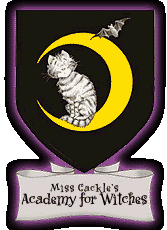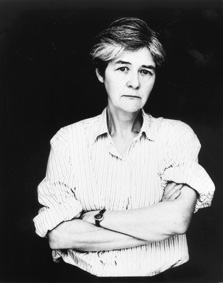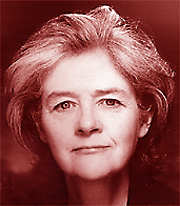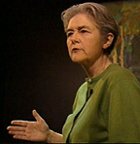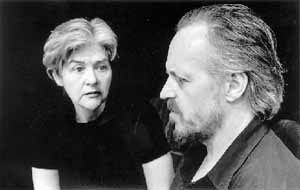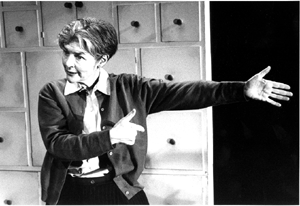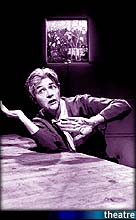|
|
|
|
 |
 |
|
Clare Coulter was born in Ontario in 1942, spent a part of her childhood in post-war London and has so far been very busy as an actress - see her filmography - mostly at Canadian theatre at which she is considered a “diva in residence”. Further down you can also read a long biographical article about her and her work. She likes to keep her private life private and shares her apartment at Toronto with a cat. In 1997 she worked on “The Designated Mourner”, in 1999 she has appeared in a Margaret Atwood adaption (“Good Bones”, including excerpts from “Good Bones” and “Murder in the Dark” which was obviously repeated in 2000) and you can read three enthusiastic reviews about the “Bones” and two about the “Mourner” further down - as well as a review about her starring in “Healing Sessions”. As for her part in WW, this is what brought U here, so need I say more?=) |
|
 |
|
|
 |
 |
 |
 |
 |
|
Filmography:
Five Senses, The (1999) .... Clare
"Worst Witch, The" (1998) TV Series .... Miss Cackle
Simple Wish, A (1997)
... aka Fairy Godmother, The (1997)
Marriage Bed, The (1996) (TV) .... Margaret Neilson
Shamrock Conspiracy, The (1995) (TV)
When Night Is Falling (1995) .... Tillie, see here:
Deadly Betrayal: The Bruce Curtis Story (1991) (TV) .... Alice Curtis
... aka Journey Into Darkness: The Bruce Curtis Story (1991) (TV)
Last Season, The (1986) .... Marie Jazda
Terminal Choice (1985) .... Nurse Barton
... aka Critical List (1985)
... aka Death Bed (1985)
... aka Death List (1985)
... aka Trauma (1985/I)
Wars, The (1983) .... Eena
By Design (1982) .... Ms. Hirshorn
... aka Sur mesure (1982) (Canada: French title)
Notable TV guest appearances
"Foolish Heart" (1999) playing "Psychiatrist" in episode: "Correct Decision, The" (episode # 1.3) 3/17/1999
"Due South" (1997) playing "Barbara Kowalski" in episode: "Easy Money" (episode # 2.2) 9/30/1998
"Newsroom, The" (1996) in episode: "Meltdown: Part 2" (episode # 2.5) 3/24/1997
"Newsroom, The" (1996) in episode: "Meltdown: Part 3" (episode # 2.6) 3/17/1997
"Ray Bradbury Theatre, The" (1985) playing "Store Owner" in episode: "Town Where No One Got Off, The" (episode # 1.4) 2/22/1986
“A Mountie in Chicago”, season 3, “Easy Money”, playing Barbara Kowalski |
|
|
|
 |
 |
 |
|
Article about Clare Coulter:
Clare Coulter walks through closed doors
by Olena Wawryshyn (Toronto,The Profiler, 1998)
When Clare Coulter started out as an actor in Toronto in the 1960s, many people assumed she'd have to move to New York or London if she wanted to pursue a career on the stage.
"If one is looking for the highest standards in your field, you go to the centres that are considered to be where you would find that," says Coulter. "I haven't done that." Instead, she made Toronto her base and helped define standards of excellence for the city's theatre scene.
'I don't know if New York is a place for actors in which you'd find higher standards.'
During her impressive 30-year career, Coulter has accumulated a long list of credits, both on TV and in films, but her main work has been on the stages of Toronto's leading small-theatre venues.
This month, when Coulter performs the witty and acerbic poems from Margaret Atwood's collection Good Bones, it will be her 26th Tarragon production. "It's an evening of words, a celebration of language and of Margaret Atwood's great gifts as a writer," says Coulter, during a rehearsal break.
Quick to praise Atwood, Coulter is modest about her own work. "I did a recording of an earlier book [by Atwood] called Murder in the Dark, . . .and I wasn't particularly happy with it," she says, explaining how the production of Good Bones emerged. "I began to learn (Good Bones) to see if I could do a better job."
After performing the conversational poems at various events and gatherings, Coulter was asked by Tarragon's artistic director, Urjo Kareda, to present them at the theatre.
For the soft-spoken actor with salt-and-pepper coloured hair and clear blue eyes, acting offers a unique way of communicating. "I like to articulate something and imagine that someone is hearing it and appreciating it in a way you can't do in a book or on a page or with music," she says.
And the 56-year-old actor has been communicating from the stage since childhood. The daughter of an Irish playwright, John Coulter, and his Canadian wife Olive, also a writer, Coulter was enrolled in a theatre school in England at the age of nine when her family moved to London. "My parents didn't think I would be happy in an academic life."
On returning to Toronto, Coulter was behind other students in subjects like math. At 15, she found herself apprenticing in the props department at Stratford until she was 21. Eventually, she got involved with Theatre Passe Muraille, but it was at the Tarragon that she found her niche.
Ironically, though her parents steered her away from academic study, today it's easy to imagine Coulter as a professor of a drama department at a university. Even her performance of Good Bones seems to be a type of academic exercise.
"This material is literary, and the stage has certain requirements, which go beyond or are different from the literary. I wanted to see whether you could put something, which is essentially literary on stage and if an audience would consider it dramatic theatre."
Many of the plays Coulter has had roles in, including works by George F. Walker, Judith Thomspon, John Murrell and Michel Tremblay, deal with social issues or, like Good Bones, are experimental in nature. Coulter is particularly known for her role in The Fever, Shawn Wallace's critique of Western materialism, and for her Dora-Award winning performance in Top Girls, Caryl Churchill's play that attacks the values of Thatcher's Britain.
A play that Coulter would like to present one day is Churchill's The Skriker. "I think the world is suffering a lot of damage and that's what the play is about in its brightest, darkest and wittiest way."
While she has plenty to say about the role of the theatre and the arts in society, Coulter is guarded about her personal life. She's willing to divulge that she lives in Toronto's Little Italy -- with a cat -- but won't say if anyone else shares her life.
Though Coulter is often invited to work on productions out of the country, she says her decision to live in Toronto has closed certain doors. Her 1996 performance of The Fever at London's Royal Court theatre was successful, but Coulter believes its run was not extended because she was seen as an outsider. "Someone said to me, 'You know, you were lucky to have been invited to play there, and you were a guest.' Doors open for you when you're a guest and then they expect you go to home."
Yet, Coulter expresses no regrets and says there are people here doing really exciting work. "I don't know if New York is a place for actors in which you'd find higher standards. It's not really a comparative thing."
It could be said that Coulter is a kind of magician, having walked through many a closed door during her career. But her best-known talent has been to grace the city's many stages for more than a quarter of a century, helping make Toronto a recognized theatre centre.
Designed and produced by Karen Ahmed
Published December 14, 1998
|
 |
 |
 |
 |
 |
 |
 |
 |
 |
 |
 |
 |
 |
 |
 |
 |
 |
 |
|
 |
|
|
|
Flesh & bones -Coulter hits the mark with solo Atwood vehicle
GOOD BONES
Featuring Clare Coulter. Adapted from the book by Margaret Atwood. Directed by Urjo Kareda. To Feb. 21. $18-$22. Tarragon Extra Space,
30 Bridgman. 531-1827.
BY KEVIN CONNOLLY
Blame it on Mark Twain if you want. One-person theatrical interpretations of literature go back at least as far as the first misguided notions of the writer as public celebrity -- not to Hal Holbrook as Mark Twain, but Samuel R. Clemens filling houses nightly in Europe and America standing in for his homespun nom de plume. Twain, by all accounts, was a charismatic, witty storyteller, but from the beginning his solo career was conceived as a moneymaker. And I guess there's nothing wrong with that -- it pulled Twain from the brink of bankruptcy more than once.
It was only a matter of time before someone adapted the concept for Canadian literature, although it took us a longer to come up with a bona fide literary celebrity. And if they were really trying to pull in the bucks, Tarragon would be running Clare Coulter's theatrical interpretation of Good Bones -- Margaret Atwood's 1992 collection of short stories, sketches, monologues and verbal experiments -- on their main stage, not in the 100-seat Extra Space.
Two caveats, though, for those tempted to prejudge Good Bones as some pseudo-theatrical middlebrow meeting of celebrated writer and beloved actor.
First, for you people who've been asleep for 20 years, Clare Coulter has been known to do a little acting. This is no fading icon sent out on the road with a safe crowd-pleaser for a meal ticket. Coulter thrives on solo work and has a year-long tour of Wallace Shawn's The Fever -- not to mention successful mountings of this show at festivals in London and Edinburgh -- to prove it.
Second, though you could never accuse Atwood of subtlety, some of the intriguing little pieces in Good Bones (and 1983's companion volume, Murder in the Dark) are as close to literary experiment as anything Atwood has written.
Granted, most of those experiments are fairly low-key dismantlings of conventional narrative, as in the humorous and much-anthologized gender satire "How to Make a Man," or Atwood's recollection of her childhood urge to finish a predictable war yarn herself when the last installment in the 1951 Boy's Own Annual goes missing.
Literary experiment has a habit of dating quickly, however, as with the forced metaphors of the opening treatise on landscape and the clumsy feminist hectoring that strays into her otherwise wonderful semiotic dissection of the cult of the female body. Coulter is not exactly playing Atwood while delivering her lines, but she does an admirable job turning Atwood's clear narrative voice into a character and tagging the occasional visiting speaker. Her subtle manipulation of a piece in which a storyteller is cross-examined by the voices of critics and cultural correctness makes the best of a slight and rather obvious finger exercise. And in a better segment depicting a parental argument over the appropriateness of their daughter owning a Barbie, the Coulter pegs the change from husband to wife by passing an imaginary plate of food back and forth.
Atwood's popularity is rooted in her familiar, affable narrators and approachable prose. But her political and intellectual pretensions have a habit of taking over, transforming what would otherwise be compelling character-based fiction into rangy, periodically didactic tomes. I've always preferred the intensity and spareness that poetry and very short stories like these demand of the writer.
Ken Garnhum's modest set -- two chairs, a table which doubles as a dock, a wall-sized sideboard and characteristically Canadian landscape paintings -- apart from two quietly effective surprises, is comfortable in its role as psychological backdrop. Given every opportunity to do too much with a static show which (in another actor's hands) might have devolved into a pretentious library reading, director Urjo Kareda deserves credit for keeping things simple. Coulter moves fluidly from dock to table, overcoat to apron, without ever forcing stage business into the mix. When a long stretch of text seems to call for a gesture, Coulter often makes do with a glance -- many a moment in Good Bones is sold by Coulter's disarming habit of looking the audience in the eye. Apart from a couple of annoying minor-key piano interruptions and occasional lapses in the writing, Coulter and company have built an intimate, well-paced and occasionally intense theatrical experience from unlikely material. |
|
|
|
Thursday, January 21, 1999 Good Bones indeed!
By JOHN COULBOURN
Toronto Sun´
Margaret Atwood may never give readings of her works again.
At least, not if she's seen the Tarragon Theatre's staging of Good Bones, which opened in the Extra Space Tuesday night.
A series of monologues drawn from Atwood's book of the same title, as well as from her Murder In The Dark, Good Bones is solidly directed by Tarragon artistic director Urjo Kareda, winsomely designed by Ken Garnhum and evocatively lit by Bonnie Beecher.
As a theatre piece, Good Bones has good bones.
But it is the flesh that makes it spectacular -- flesh supplied by Tarragon's seeming diva-in-residence, Clare Coulter.
Coulter is no stranger to Tarragon audiences, best known lately perhaps for her turns in Wallace Shawn's Aunt Dan And Lemon, The Designated Mourner and his one-woman-show, Fever, which she toured extensively.
But in Good Bones, Coulter truly hits her stride, taking a series of unrelated monologues by diverse characters, binding them together only by the strength of her performing genius.
Some are mundane, like Everlasting, in which she recalls childhood camping.
Others, like Third Handed, flirt with the metaphysical. Some, like Strawberries, flirt with rage, while still others are simply playful, like Making Poison.
Sometimes, as in Before The War and the delightfully silly Stump Hunting, she speaks with a voice that could be male, while in others, she is the consummate female, as in Making A Man and The Female Body.
And she caps it all in Good Bones, in which she transforms, before our eyes, into an aged woman, reflecting on her failing body.
For those who demand things like plot and dialogue as part of the theatrical experience, Good Bones may be entertaining, even though it likely won't prove delightful.
But if your taste in things theatrical is predicated on fine writing and strong performance, there are few tickets to rival Good Bones for total satisfaction.
At the zenith of Canada's literary community, Atwood's work demands that it be brought to the stage only by the best.
That's what it gets in Good Bones.
Problem is that Coulter is so good that Atwood may never read aloud again. |
|
|
|
Atwood's Good Bones makes for a good show
Margaret Atwood's Good Bones
Starring: Clare CoulterDirected By: Urjo Kareda
By Andrea Chiu
Gazette Staff
Sitting in the McManus Theatre absorbing Margaret Atwood's Good Bones is similar to sitting at home listening to grandparents tell their life stories.
The one woman show, starring Clare Coulter, takes selections from Atwood's short stories, Good Bones and Murder in the Dark. The short prose is woven together so well that it presents itself as much more of a woman's autobiography than individual stories.
To reflect the play's simple form, the costumes maintain an uncomplicated feel, as seen in Coulter's homely clothing. Similarly, the set is simple, consisting of a couple chairs, a wall of drawers and a table that doubles as the end of a dock.
One of the best features of the play is the lighting, designed by Bonnie Beecher. She manages to use the minimal set and plays with dimming and illumination to create effective mood and daylight.
The sound effects are also basic. The piano interludes between some scenes are inappropriately eerie, but the sounds of waves fit well with the natural set and cottage feel.
There are no glamorous things to be said about Margaret Atwood's Good Bones. It is afterall, a one-woman play, and to make it anymore complicated would take away from the true star of the show: The words of Margaret Atwood.
Atwood is a truly beautiful storyteller who has a way of creating phrases so simple and insightful, you wish you had come up with them yourself.
Granted, some scenes tread on the dull side, such as "Everlasting" from Atwood's Murder in the Dark. The majority of monologues, however, are great – at times sad, at times ridiculous and funny. Filled with subtle humour and sarcasm, the audience is again reminded of how beautifully crafted Atwood's words are and how intelligent her commentary on the human state can be.
Demonstrating humanity's struggle in the "We Want It All" scene, Coulter effectively recites Atwood's prose, but seems to stumble on her lines at some points in the performance. Still, she manages to display her talent jumping from monologue to monologue, each with distinctly different characters and moods. Coulter was most impressive in "There was Once," a scene where she plays both participants in a quirky conversation.
Perfectly complementing the scenes before it, the "Good Bones" scene closes the play with a discussion on old age. A bittersweet commentary, it slowly yet appropriately takes the audience back to a more personal reality and conclusion.
While grandparents may also have interesting stories of wisdom to tell, few sound as eloquent as Margaret Atwood.
Margaret Atwood's Good Bones will be playing at the McManus Theatre through Mar. 11. Tickets are $8. |
|
|
|
 |
|
|
|
Healing Sessions
By JOHN COULBOURN
Toronto Sun
There are those who make the voyage - and those with whom they share the snapshots.
And Sessions - the unconventional performance piece that opened on the stage of the Tarragon Theatre's Extra Space Tuesday night - is an invitation to share the troubled mental voyage of a single psychiatric patient, through "snapshots" of her voyage to mental health.
Excerpted from a collection of 19 hours of actual taped treatment sessions between analyst Dr. Clifford Scott and a female patient identified only as J.R., the hour-long work falls more into the category of "interesting experiments" than "riveting theatre," however.
Directed by Daniel Brooks, Sessions features Daniel MacIvor as the Canadian-born Dr. Scott and Clare Coulter as J.R. Together, they recreate in the minutest of details - sneezes, stammers and asides - their shared rosary of of self-discovery, in moments ranging from amusing snippets to discerning dialogue.
On Jim Plaxton's scrimmed black-box set, suspended in time, the two move (or more accurately, sit) through their sessions, backdrop to an ubiquitous reel-to-reel tape recorder that at times almost becomes a third character, pivotal in this conceit.
At its very best, Sessions serves as a showcase for the superb talent that is Coulter - an actress whose fascination with conversation-as-drama has already manifested itself in The Seaford Tapes. Here, she effects a seamless transformation of self - becoming in every way the troubled British housewife she is playing.
It is, in fact, the excellence of Coulter's portrayal that exiles MacIvor to the ranks of the also-rans. Otherwise excellent, when compared to Coulter's flawless presence, MacIvor's credible work is reduced to mere impersonation.
But even at its best, Sessions doesn't add up to satisfying theatre for any but the most devout fans of the performance process.
For the rest of us - those who see theatre as more than an bland imitation of life - it's merely interesting. Devoid of meaningful theatrical device, any conflict that exists is largely internal, any resolution, infinitesimal.
In the end, in art as in life, snapshots run a distant second to making the voyage ourselves.
SUN RATING: 3 OUT OF 5 |
|
|
|
 |
|
|
|
Thursday, September 25, 1997
Mourner won't disappoint the thinking theatregoer
By JOHN COLBOURN
Toronto Sun
It's difficult to imagine a way in which the Tarragon Theatre's production of The Designated Mourner could be improved.
Lucidly written by Wallace Shawn -- the diminutive actor/playwright of Aunt Dan And Lemon and Fever fame -- the production stars Paul Bettis and Eric Peterson, teamed with local Shawn-ophile Clare Coulter. They are all superb, in a seamlessly-fused unit created by director Daniel Brooks.
So, if your passion for theatre is fired as much by process as by passion, Mourner ranks as a must-see show -- a technically near-perfect piece of theatre.
For the rest -- those who look to theatre to have heart and adrenal gland massaged along with the grey matter -- it may be a different story.
Set in an unnamed but contemporary country, Mourner could best be described as a faux-umentary -- three characters, three largely disconnected reminiscences that, like the pieces in a huge jigsaw puzzle, eventually fall into line to create a casual, distant portrait of horror in the face of repression.
Howard (Bettis) is a poet and one-time essayist.
Judy (Coulter) is his daughter.
Jack (Peterson) is Judy's husband, Howard's son-in-law and a regressive Philistine -- a man who, by his own confession, would rather watch TV or read skin magazines than read poetry, when left to his own devices.
By the end of the play, Jack the rat has become the sole survivor of the trio. His wife and his father-in-law, both of whom he has abandoned, are now dead at the hands of the government, revolutionaries, or perhaps the great unwashed, referred to here as dirt eaters.
So it falls to Jack to mark their passing in an archaic ritual garnered from an old magazine article, to don the sackcloth of the designated mourner and send them on their way in a symbolic blaze of glory. ´
Shawn's script is certainly thought-provoking, even chilling, as it charts a leisurely travelogue through a countryside where the natives are more than restless, surviving as they are on the meat and muscle of their own culture.
But in the characters of Howard and Jack, he has created not the opposing forces of art and chaos, but rather two poseurs dangling self-consciously at either end of a diseased continuum of ennui.
Like great theatre should, The Designated Mourner leaves your head buzzing with ideas -- on everything from the role of culture to the lunches your mother used to pack.
But it leaves your heart largely untouched -- and that seems to me to be great theatre for the dilettanti.
SUN RATING 4 OUT OF 5
|
|
|
|
The Designated Mourner
by Wallace Shawn, directed by Daniel Brooks
Tarragon Theatre Mainspace, September 16 - October 26, 1997
A Stage Door Review by Roger Kershaw and Jim Lingerfelt
(Your comments and reviews are also welcome. Please?)
Morality and intellectual suffocation a wild ride
The Designated Mourner by Wallace Shawn, and directed by Daniel Brooks had its Canadian première last night at the Tarragon Theatre Mainspace and opened to an enthusiastic and appreciative crowd. It was recently mounted at the prestigious Edinburgh Festival, where we wondered if those notoriously tough audiences felt as we did: part of a wild roller coaster ride that was exciting, scary, dangerous, and that sometimes had us wondering why we got on, although loving it. Though difficult to characterize, the play, like all great innovative theatre, pushes the envelope and the audience in its ability to provoke thought and opinion while awash in fabulous acting, lights and sound.
Sleazy character actor (Princess Bride, Clueless) and controversial playwright (Aunt Dan and Lemon, The Fever) Wallace Shawn has created one of the most interesting plays of the year. Shawn's artistic crusade to rip away the camouflage of morality continues in this most unsettling play about a barbarous Orwellian world where intellect is abhorred and feared. Shawn's bizarre tale is related by Jack (Eric Peterson), a former student of English literature. In some cultures, explains Jack, a representative of the bereaved is appointed as the chief mourner. And in some extreme cases, when an entire tribe or clan is wiped out, anyone who has ever once had contact with the departed may serve, even a child from another group. As the lone survivor of an autarchic ban to recall life within a circle of friends and family from a now-extinct intellectual community, or what he terms "the disembowelling of the over-embowelled," Jack has appointed himself The Designated Mourner.
The details of this sad history are sometimes related subtly, light-heartedly and circuitously so that when the gory details do arrive they come as literate shock therapy. The author has described the mood of the play as "one of mourning and lament." An apt description, but Jack's monologues, especially during the first act's 75 minutes, alternate between cynicism, laughter, and explosive opinion.
Jack's memory brings back, as stagemates, his estranged wife Judy (Clare Coulter), a refined lover of literature and music, and her father Howard (Paul Bettis), a celebrated poet and, by all accounts, self-absorbed pain in the rear. The three characters hardly interact, but when they do, especially in a vivid dream sequence, it adds a new and clearer dimension to the individuals, somehow making them real. Their speeches and anecdotes are presented to encourage audiences to think critically and not look for easy answers. It may sound too cerebral for some tastes, but abundant concepts are presented, and everyone will take home something different.
Our keen interest, despite the daringly minimalist form of three actors and three chairs, validates the brilliant revolutionary power of Shawn's language perfected by wunderkind director Daniel Brooks. The design team of Julie Fox and Michael Levine (set), Andrea Lundy (lighting), and Richard Feren (sound) has created a barren world that mirrors the characters' existence. Specifically, the marvellous back, side and front lighting of the three players is eerie and richly evocative. Coupled with the sensational sound effects, the design helps produce some unforgettable moments of theatre.
The trio of actors couldn't be bettered. Peterson does a brilliant turn as Jack, a sardonic character who looks a little slovenly, but is animated and fun, bringing a depth of emotion to a blithe character that can be difficult to communicate. He jumps on the roller coaster and doesn't let up until the last few passages when he reclines with a final chuckle, seemingly exhausted in his chair, accompanied by the longest light fadeout in recent memory.
Clare Coulter, who has personally lobbied to bring Shawn's often-controversial plays to Canada, now brings a wealth of experience to the role of Judy. Intense and often moving, her character has to alternate between powerfully affecting monologues and interaction with Jack and Howard. Coulter is also relegated to long periods of still silence. It's a very tough job for this definitive Shawn interpreter.
Paul Bettis makes his Tarragon acting debut as Howard, having previously directed works by Mavis Gallant and Steve Petch for the theatre. He broods and condescends well, though his is the lesser of three roles, absent entirely from the second, and shorter, act.
Literate, entertaining, and wonderfully refreshing, the play left an indelible stamp on us with Shawn's innate ability to arouse debate. In the world of tuneless musicals and stuffy dramas, that is remarkable.
The Designated Mourner continues until October 26. It plays Tuesday through Saturday at 8 p.m. Tickets $20-$25; Saturday matinee at 2:30 p.m. Tickets $20; Sunday PWYC matinee at 2:30 p.m.
|
|

